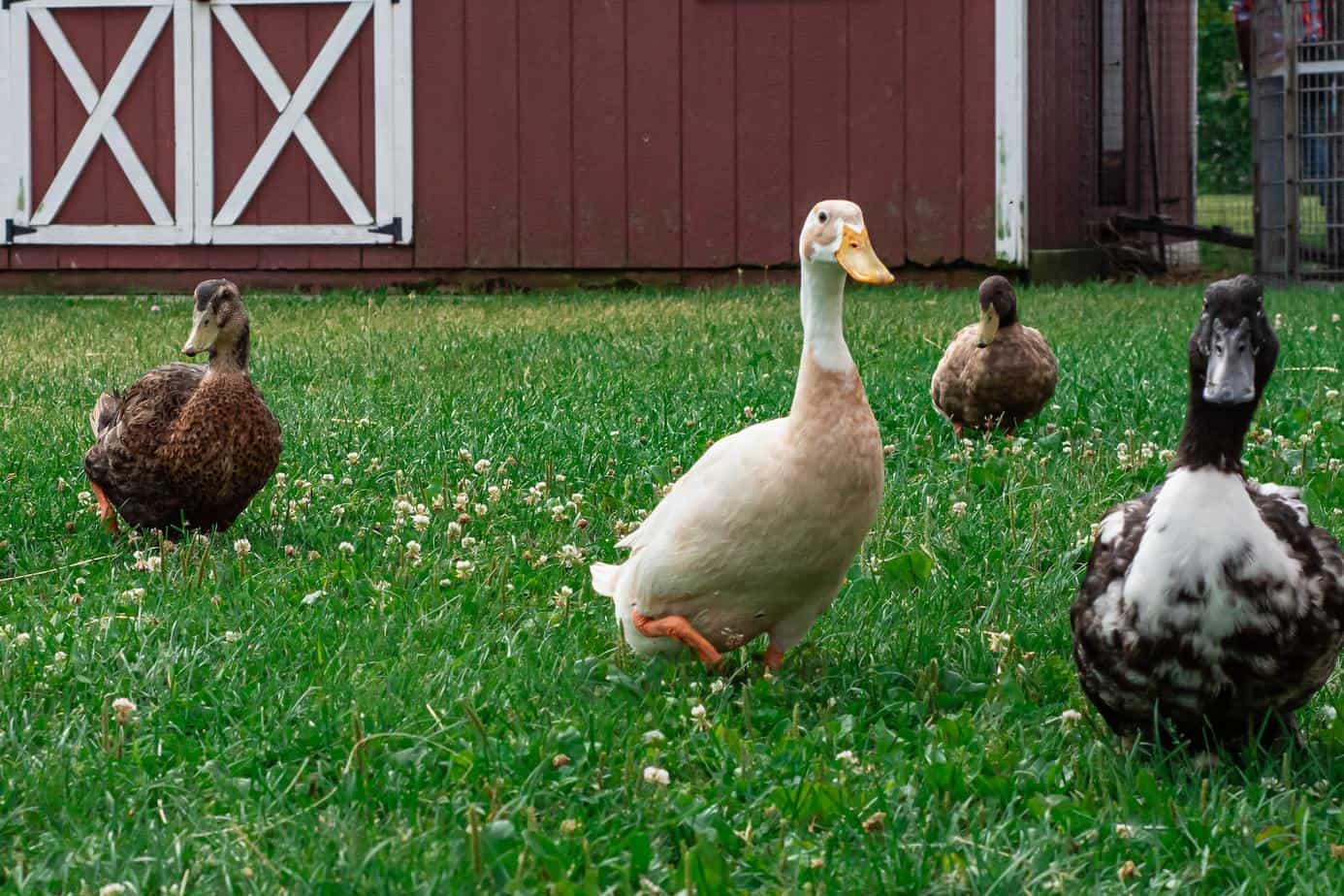Ducks, on average, will live between 5 and 10 years, depending on the breed, but they can live much longer – some for as many as 20 years – if they are well-cared for. Whether you keep ducks as pets in your back garden or have them roaming free in the fields of your homestead, you’ve no doubt wondered about the lifespan of a duck. You do, after all, want these helpful little creatures around as long as possible! How long ducks live is, in part, down to their breed. But it can also depend on many human-controlled (or human-aided) factors. These include their nutrition, housing, general wellbeing, and environment.
What was the oldest known duck?
There are several stories of pet ducks reaching ages into their 20s. Stories include Ernie from the UK – who reached aged 21 – and Edwina – who reached aged 22. According to Ducks.org, the oldest duck to be hunted reached the amazing age of 29.
Which duck breed lives the longest?
While the Pekin duck holds the record for the longest life, many duck owners have reported particularly long life spans in their Muscovy ducks. Pekin ducks tend to live between 5-10 years. Muscovy duck owners, on the other hand, have recorded lifespans of between 8 and 12 years.
Duck lifespans by breed
| BREED | AVERAGE LIFESPAN | COMMENTS |
| Pekin | 5-10 years | Some owners have reported Pekin ducks living as long as 20 years. |
| Call | 7-10 years | Some owners have reported longer life spans, but it is not that common. |
| Indian Runner | 8-12 years | In the wild, Indian Runner ducks have a much lower lifespan, with one to two years being the average. |
| Khaki Campbell | 8-10 years | Some owners have reported Khaki Campbell ducks living as long as 15 years. |
| Mallard | 8-10 years | In the wild, mallard ducks may only live between 3 and 5 years. |
How long do Pekin (white) ducks live?
Generally, Pekin ducks – also known as white ducks – will live between 5 and 10 years. Some owners have reported their Pekins living as long as 20 years. Between 5 and 10 seems to be the norm, though.
Note that some people refer to Pekin ducks as ‘yellow ducks’ because when they are young ducklings, they have a yellow coloring that fades into white as they get older. Yellow ducks, then, have the same lifecycle as white ducks as they are the same bird.
How long do call ducks live?
Call ducks are smaller than the more common white ducks, and they tend to live between 7 and 10 years. As with other duck breeds, some owners have reported ducks that live longer, but in general, a call duck will live between 7 and 10 years.
How long do Indian Runner ducks live?
Domesticated Indian runner ducks can live up to 12 years old. The average tends to be somewhere between 8 and 12 years. Lifespans in the wild are much shorter. Just one or two years is the average lifespan of a wild Indian Runner duck.
How long do Khaki Campbell ducks live?
Khaki Campbell ducks have been reported to live for up to 15 years. That said, somewhere between 8 and 10 years seems to be the most common among owners we consulted.
How long do mallard ducks live?
In the wild, mallard ducks only live between 3 and 5 years. If well-cared for in a healthy homestead environment, they can live up to 10 years like their Pekin and call duck counterparts.
https://www.pinterest.com/pin/749075350520235798/Factors that affect how long a duck lives (on a homestead)
Several factors affect how long a duck will live on a homestead. While the exact environment on any given homestead will vary considerably from the next, there are some common areas where care and attention can contribute significantly to extending your ducks’ lifespans.
Duck nutrition
In addition to knowing what you should feed your ducks to extend their lifespan, you should also know when to feed them. Ducks have different feeding requirements depending on their age/development stage. Taking this into account is important for ensuring optimal nutrition.
Ducklings should be fed duck starter, of course. Duck starter is a special mixture for very young birds delivering carefully balanced nutrition. When they reach a few weeks to a month old, ducks can be fed on grower.
Grower, as the name suggests, gives them extra nutrients to fuel their fast growth at that stage of their life. After a few months, ducks can be moved onto lower protein foods that ensure healthy development without excessive weight gain.
Critical, of course, is that ducks have an ample supply of greens. Helpfully, ducks will clear up weeds and even keep the grass trim if you’ve got them roaming in a back yard area or similar. That tends to keep their energy levels up and their vitamin levels in check. Throwing them some clean vegetable peelings and other plant matter can be an effective boost if you’ve got it to hand, though.
Ensuring ducks have an adequate supply of grit is also critical to ensuring a long lifespan, as it helps them to digest the food they’ve eaten elsewhere on their travels around the homestead.
Finally, make sure your ducks have access to a large supply of clean water. Anyone who has owned ducks knows they like to play and paddle in water, so if you’re only putting out a bowl full at a time you will find yourself filling up several times a day (or hour…). Give your ducks a fresh supply of water at least twice a day and ensure it is served to them in a water container deep enough for them to submerge their whole heads.
Duck housing
Want your ducks to live long lives? Making sure that ducks have someone safe to shelter and sleep is just as important as making sure they have a healthy supply of food to eat. While ducks are indeed low-maintenance birds compared to some of their feathered counterparts, you still need to provide at least minimal housing for your flock, depending on your location/weather, etc.
Ducks huddle together when they sleep, so between four and six ducks can sleep in a house of approximately 12-18 square feet in area (approximately 3.6 to 5.5 square meters).
If your duck house has openings on one side, make sure they are facing away from the usual wind direction and that there is at least an option of closing all sides if the weather is particularly bad.
Obviously, duck housing should be appropriate for known predators. Foxes, especially, are adept at digging under fencing and chewing through thin wood paneling, so make sure you reinforce your duck housing to give them the best chance at a long lifespan.
As a last note, keeping the duck’s housing clean is imperative. No-one likes the job of cleaning up poop from coops and tractors, but it is absolutely necessary if you want to keep disease and pests at bay.
Duck wellbeing
Ducks, like other animals, have needs that far extend beyond their basic food, water, and shelter requirements. And that means, as a duck owner, that you have a responsibility to ensure that their general wellbeing is maintained.
Keeping your ducks fed and sheltered is, of course, your main priority, but they should also have access to other ducks for socializing and to varied environments to enhance their overall quality of life. If you let your ducks roam free, they likely will keep themselves occupied all day quite merrily. If you keep ducks in a coop or tractor, however, make sure you move it around often. Not only does this give them access to fresh grass, but it also ensures they get a change of scene, contributing to their overall health and happiness.
Well-being also extends to veterinary care. Regular flock checkups and prompt responses to any medical needs (major or minor) are obvious means of ensuring your ducks live a long life. You can also buy natural supplements to add to food and water to help combat disease and illness that might negatively impact your ducks’ lifespans.


